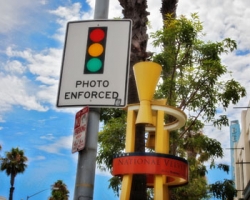
An appellate case targeting the legality of red light cameras could have a profound effect on Culver City and its traffic control program, says a leading expert in red light photo tickets.
Sherman Ellison, an attorney representing the plaintiff in People vs. Stephen Gray, believes the court’s decision could have consequences that reverberate throughout the region and especially in Culver City. “If statutes were violated, there could be a huge class action suit against Culver City,” he said. “It could force them to make appropriate intersection changes.”
Ellison’s client Stephen Gray was photographed by a red light camera at the intersection of Washington Boulevard and Helms Avenue in Culver City on Nov. 21, 2008. Section 21455.5 (b) of the state Vehicle Code states that cities are required to give a 30-day notice of where all red light cameras will be installed, along with its location, prior to issuing any citation.
“But Culver City only noticed one, at Washington and La Cienega [Boulevard],” Ellison said. “It never issued any warning of the other intersections, including at Washington and Helms, which was installed in 2006.”
Gray was found guilty of the infraction in Santa Monica Municipal Court and appealed the verdict to a state appellate court. A ruling was expected last month, but the court has taken more time than usual, Ellison said. “This is very atypical. Obviously, [the court] is struggling with the language of the appeal,” the attorney surmised. “We understand that there are huge financial and political implications in this case.”
The attorney said other cities that have red light cameras – West Hollywood, Santa Monica and Beverly Hills – have followed the vehicle code statute.
The Culver City Red Light Photo Enforcement program was put in place in March 1999 and became fully operational February 2000. There are 17 intersections that use the photo cameras and the fines that are collected from the traffic cameras go into two city-controlled funds.
“The citation fee is approximately $100, but the courts always add on additional fees,” Lt. Milton McKinnon of the Culver City Police Department explained in an interview last year. “The fees are set by the state Legislature, so police departments don’t get to choose how much money [cities] get from the citations.”
The Los Angeles City Council announced late last month that its red light photo initiative would be terminated as of July 31. Motorists who were cited with infractions in Los Angeles typically paid fines of $476.
Culver City Police Lt. Ronald Iizuka, the department’s community relations officer, issued a statement explaining the differences between Culver City’s red light initiative and what Los Angeles had in place.
“The city of Culver City utilizes a different system than the system used by the city of Los Angeles. Each incident is carefully reviewed and scrutinized by a sworn police officer to ensure that a violation has occurred and that all requirements of the California Vehicle Code have been met,” the statement read.
“It is the [Culver City] Police Department’s intent to reduce incidents of red light violations and maximize traffic flow by maintaining the community’s red light camera program and traffic safety operations in general.”
Ellison, who has won reversals of traffic cases in appellate and federal court, said minor adjustments could make a big difference in reducing tickets and accidents at red light camera intersections. “If the time between the changes between the red and yellow lights were adjusted by one second, that would solve a lot of problems,” he said. “If Culver City wanted to increase safety of the motoring public, they simply need to lengthen the delay between cross traffic.”
Vice Mayor Scott Malsin does not anticipate any changes to the city’s photo traffic enforcement. “There are studies that show that they have reduced the number of injuries at the intersections where they are located and public safety is my biggest concern,” said Malsin, who lives within blocks of a red light camera on Washington and Beethoven Street.
“If public safety was the primary concern, they could extend the delay in the yellow light intervals by one second,” Ellison countered.
Robert Zirgulis, a substitute teacher at Culver City High School, has been the city’s most outspoken opponent of red light cameras and he made outlawing them the central theme of his campaign for city council last year.
He believes Culver City’s lawmakers should follow their Los Angeles counterparts in disbanding the program. “I have been vindicated for all my efforts against the red light camera mess,” asserted Zirgulis, who is seeking a seat on the Culver City Unified School District’s Board of Education. “I got the Culver City Democratic Club to pass a resolution calling for an end to red light cameras, but it appears the city council members have chosen to ignore the will of the voters.”
Ellison is asking that an amnesty program be instituted in Los Angeles for those who have not paid their fines. In Culver City, that is not recommended.
“Drivers should be aware that there are consequences for ignoring a red light camera citation issued by the Culver City Police Department,” Iizuka warned.
Malsin said he did believe that the fines were somewhat excessive, but noted as McKinnon pointed out that the city has no control over the amount of the infractions. “If it were in my power to lower the fines, I would,” the councilman said.
Ellison said that if his client triumphs in the appeals process, he would petition to have the opinion published. “If we win, this could revolutionize the photo camera environment,” he predicted.
Caroline Castillo, a Century City lawyer representing Culver City in the People vs. Gray, declined to comment on the case.
